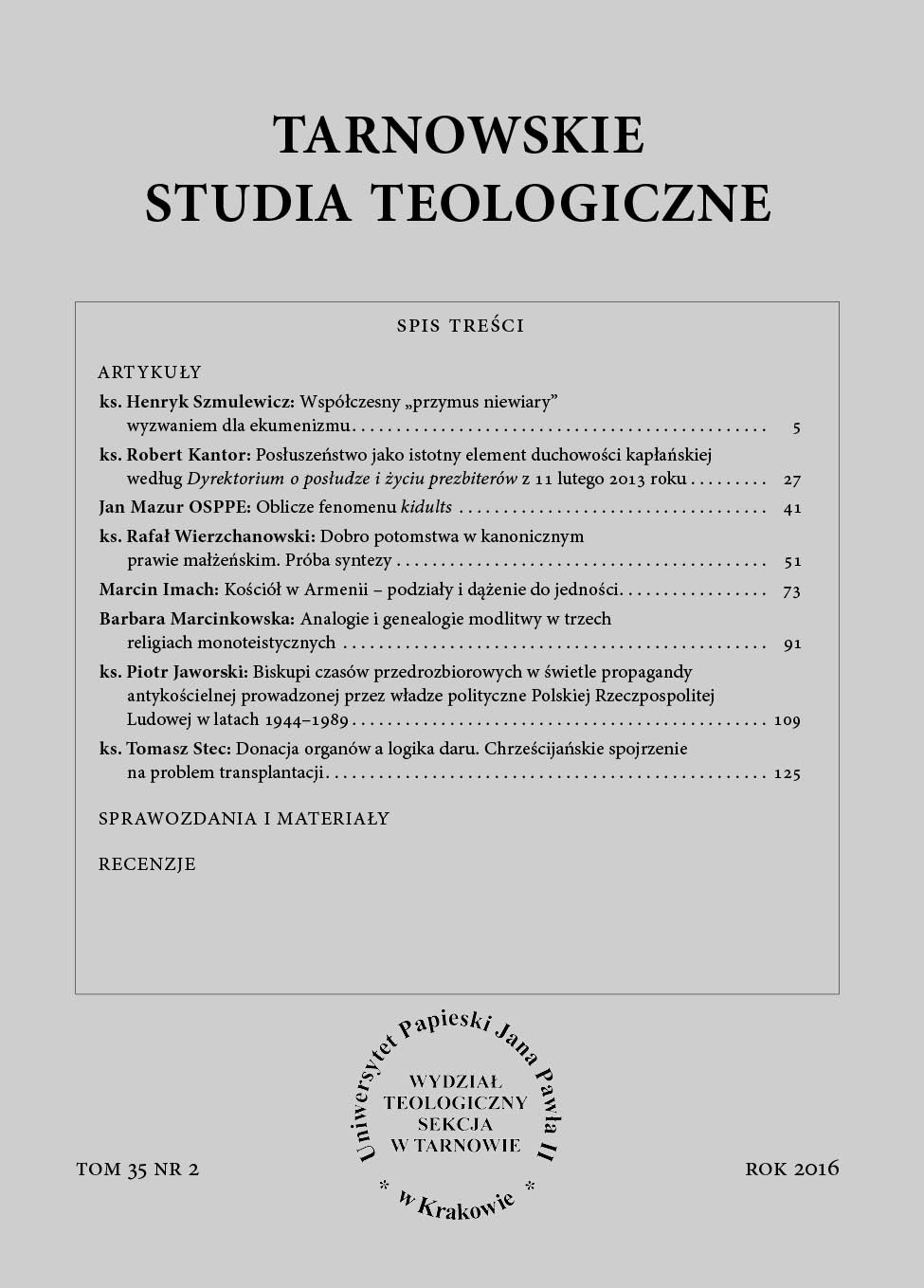Oblicze fenomenu kidults
DOI:
https://doi.org/10.15633/tst.2104Słowa kluczowe:
kidults, dorosłość, dziecinność, młodość, dojrzała osobowość, leming polityczny, hedonizm, egoizmAbstrakt
Zjawisko kulturowe kidults zostało rozpoznane stosunkowo niedawno. Jest ono konsekwencją postępujących zmian cywilizacyjnych. Samo słowo kidults składa się z dwóch słów: „dziecko” i „dorośli”. Po raz pierwszy zostało użyte na łamach „The New York Times” w 1985 roku. Peter Martin zastosował go na określenie ludzi, którzy korzystając z doświadczeń swojej dorosłości, uciekają od jej trudów i zobowiązań. Są wprawdzie dorośli, ale pod wieloma względami ich poglądy i postawy kryją w sobie elementy zdziecinnienia.Tekst zawiera trzy części, których tytuły wskazują na jego treść: 1. Kim są kidults?, 2. Kidults w sferze społecznej, 3. Chrześcijaństwo wobec kidults. Można skonstatować, że dziś istnieje całe pokolenie kidults. Tacy ludzie uparcie kojarzą życie z dzieciństwem i młodością. Niestety, wiąże się to z osłabieniem czy nawet zanikiem etyki obowiązku i pracy, przy jednoczesnym hołdowaniu etyce hedonistycznej.
Wydaje się, że chrześcijaństwo dysponuje skutecznymi środkami do przezwyciężania tego wszystkiego, co w fenomenie kidults stanowi egzystencjalne zagrożenie, kwestionuje dojrzałą dorosłość, zaciemnia świadomość nadprzyrodzonej godności człowieka, pogrąża go w marazmie duchowym i fałszuje obraz i podobieństwo Boga w człowieku. Najważniejszym środkiem jest moc czynnej miłości chrześcijańskiej, realizowanej w relacjach międzyosobowych.
Bibliografia
Barrie J. M., Piotruś Pan i Wendy, tłum. M. Rusinek, Kraków 2014.
Bojar A., Mistrzak M., Maminsynek polski, „Wprost” 2010 nr 43, s. 60–61.
Brooks K., Nothing sells like teen spirit: the commodification of youth culture, w: Youth cultures: texts, images, and identities, eds. K. Mallan, S. Pearce, Westport 2003, s. 1–16.
Cataluccio F. M., Niedojrzałość. Choroba naszych czasów, tłum. S. Kasprzysiak, Kraków 2006.
Gębicka-Andrian M., Dzieci Piotrusia Pana, „Wprost” 2006 nr 22, s. 68–70.
Janicki M., Władyka W., Strategia leminga, http://www.polityka.pl/tygodnikpolityka/kraj/1528687,1,kim-jest-polityczny-leming.read (8.05.2015).
Kidults w średnim wieku, „Rzeczpospolita” z 7.11.2007, http://www.rp.pl/artykul/67388.html (8.05.2015).
Kozłowska P., Dorosłe dzieci, „Przekrój” 2006 nr 14, s. 56–58.
Mazur J. OSPPE, „Kidults” as a phenomenon of postmodernity, „Moлoдь i pинок” (Дрогобич) 2015 nr 7 (126), s. 143–146.
Noxon Ch., Rejuvenile: Kickball, Cartoons, Cupcakes, and the Reinvention of the American Grown-up, 2006 (online book preview).
Seligman M. E. P., Walker E. F., Rosenhan D. L., Psychopatologia, tłum. J. Gilewicz, A. Wojciechowski, Poznań 2003.
Semka P., Kidulci z Platformy, „Wprost” 2008 nr 8, s. 26–27.
Stare dzieci: młodzi Polacy nie chcą się usamodzielniać, https://www.google.pl/?gws_rd=ssl#q=Pokolenie+bamboccioni (8.05.2015).
Śliwiński P. J. o., Zdziecinnienie – przekleństwo, marzenie czy metoda?, w: Dzieckiem podszyte. Rzecz o dzieciństwie, red. A. Regiewicz, Zabrze 2000, s. 53–58.
Walulik A., Dorosłość kształtowana przez dzieciństwo, w: (Bez)radność wychowania…?, red. Z. Marek i M. Madej-Babula, Kraków 2007, s. 79–91.
Zwoliński A. ks., Kidults – dorosłe dzieci, http://www.katolik.pl/24557,416.druk?s=1 (8.05.2015).
Zwoliński A. ks., Tato, gdzie jesteś?, Kraków 2015.
Pobrania
Opublikowane
Numer
Dział
Licencja
Prawa autorskie (c) 2017 Jan Mazur

Utwór dostępny jest na licencji Creative Commons Uznanie autorstwa 4.0 Międzynarodowe.
Autorzy publikujący w czasopiśmie udzielają jego wydawcy zgody o następującej treści:
- Autor zachowuje autorskie prawa majątkowe do utworu, a jednocześnie udziela wydawcy czasopisma zgody na jego pierwszą publikację w wersji drukowanej i wersji online na licencji Creative Commons Uznanie autorstwa 4.0 Międzynarodowe oraz zgody na wykonywanie opracowań, w tym przekładów.
- Autor ma możliwość udzielania zgody niewyłącznej na opublikowanie utworu w wersji, która ukazała się w czasopiśmie (np. zamieszczenia go w repozytorium instytucjonalnym lub opublikowania w książce), wraz z informacją o jego pierwszej publikacji w czasopiśmie.
- Autor może umieścić swój utwór online (np. w repozytorium instytucjonalnym lub na swojej stronie internetowej) jeszcze przed zgłoszeniem utworu do czasopisma.

